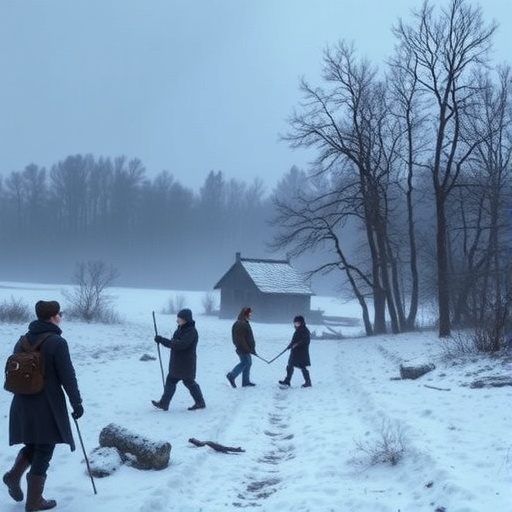In the realm of biology, a long-standing theoretical premise suggests that a higher reproductive output may exact a toll on an organism’s lifespan. This hypothesis, rooted in the life-history theory, posits a trade-off between reproductive efforts and somatic maintenance, potentially accelerating aging due to the energy allocation towards offspring rather than bodily upkeep. Despite over a century of inquiry, empirical data in human populations have remained inconclusive, casting doubt on the universality of this trade-off within our species.
Recent groundbreaking research spearheaded by a collaborative team from the University of Groningen (Netherlands), the University of Exeter (UK), and the University of Turku (Finland) sheds new light on this enduring question. Their study, published in the prestigious journal Science Advances on November 7, 2025, demonstrates that environmental adversity significantly modulates the cost of reproduction in women, fundamentally linking reproductive effort to decreased lifespan under harsh conditions.
This extensive investigation capitalized on historical demographic records from Finland, focusing on a particularly turbulent period in the 1860s characterized by successive harsh winters. These climatic extremities precipitated crop failures and severe famine, constituting a natural experiment to probe the interaction between environmental stress and reproductive biology. The research team led by Euan Young from the University of Groningen harnessed this unique dataset to unravel the complex dynamics merging ecological hardship with human longevity.
The dataset encompassed life-history information from 4,684 Finnish women over an expansive 250-year span, providing robust longitudinal data rare in human evolutionary biology. Crucially, the analysis stratified women based on their exposure to famine conditions during their reproductive phase—defined as ages 19 to 45. This stratification allowed for a granular examination of how external stressors influence the physiological costs imposed by childbearing.
Empirical findings revealed a stark contrast in lifespan contingent on reproductive output amidst adversity. Women who endured famine during their fertile years and had numerous children exhibited significantly shortened lifespans. Data showed that mothers with a single child had an average lifespan of 71.6 years, whereas those with fifteen children lived only about 64.3 years. This translates to an average lifespan reduction of approximately six months per additional child, a compelling quantitative affirmation of reproductive costs intensified by environmental hardship.
Contrastingly, women who either did not experience famine or encountered it outside their reproductive years did not exhibit the same lifespan decrement associated with increased offspring. This nuance underscores the critical interplay between temporal exposure to ecological stressors and reproductive biology, suggesting that the biological cost of reproduction is not uniform but context-dependent.
The mechanisms underpinning these observations likely relate to the metabolic and physiological demands imposed by reproduction. Pregnancy, lactation, and child-rearing require substantial energy and nutrient investment. During periods of famine, such demands may exceed bodily reserves, impairing somatic maintenance and accelerating cellular wear and tear, thereby hastening senescence. This aligns with the disposable soma theory, which postulates that organisms optimize energy allocation between reproduction and somatic maintenance to maximize fitness.
Euan Young articulates the broader implications of these findings, emphasizing the shift in understanding human aging within ecological contexts. “For more than a century, reproductive biology’s impact on lifespan has been debated with inconclusive results in humans. Our research conclusively illustrates that under environmental duress, reproductive output decisively influences female longevity,” he stated. This insight reframes prior assumptions and invites integrative approaches considering environmental variables in aging research.
Furthermore, this study resonates with evolutionary biology principles, exemplifying how life-history trade-offs are modulated by external pressures. It highlights the importance of incorporating historical and ecological data to dissect complex biological phenomena that contemporary controlled studies may fail to replicate due to stable modern conditions.
Technically, the research employed advanced statistical analyses on comprehensive parish records, integrating birth, death, and environmental data over centuries. This method allowed researchers to control for confounding factors and isolate the effect of reproductive number and famine exposure on lifespan with considerable precision. The rigorous analytical framework reinforces the validity and reliability of the results.
This revelation holds significant implications for public health and understanding human demographic transitions. It suggests that historical and perhaps contemporary populations facing environmental or nutritional stress may bear hidden health costs through reduced lifespan linked to high fertility. This knowledge informs not only evolutionary biology but also socio-ecological health policies in vulnerable communities.
In summary, this multi-decadal and multinational investigation conclusively positions environmental adversity as a pivotal contextual factor intensifying the reproductive cost on female lifespan. It bridges gaps in human aging research, resolving ambiguities lingering for decades and establishing a nuanced paradigm where reproductive effort and ecological hardship converge to shape longevity.
As aging research advances, integrating environmental variability with biomolecular and demographic studies promises to enrich our grasp of human life-history evolution. This study stands as a seminal contribution, elucidating how the toll of motherhood, under unforgiving conditions, subtly but profoundly curtails lifespan, emphasizing the delicate balance between reproduction and survival.
Subject of Research: Not applicable
Article Title: Mothers facing greater environmental adversity experience increased costs of reproduction
News Publication Date: 7-Nov-2025
Image Credits: Nynke Wemer
Keywords: reproductive cost, lifespan, environmental adversity, famine, life-history theory, human aging, evolutionary biology, maternal health, longevity, trade-offs, metabolic demands, natural experiment




